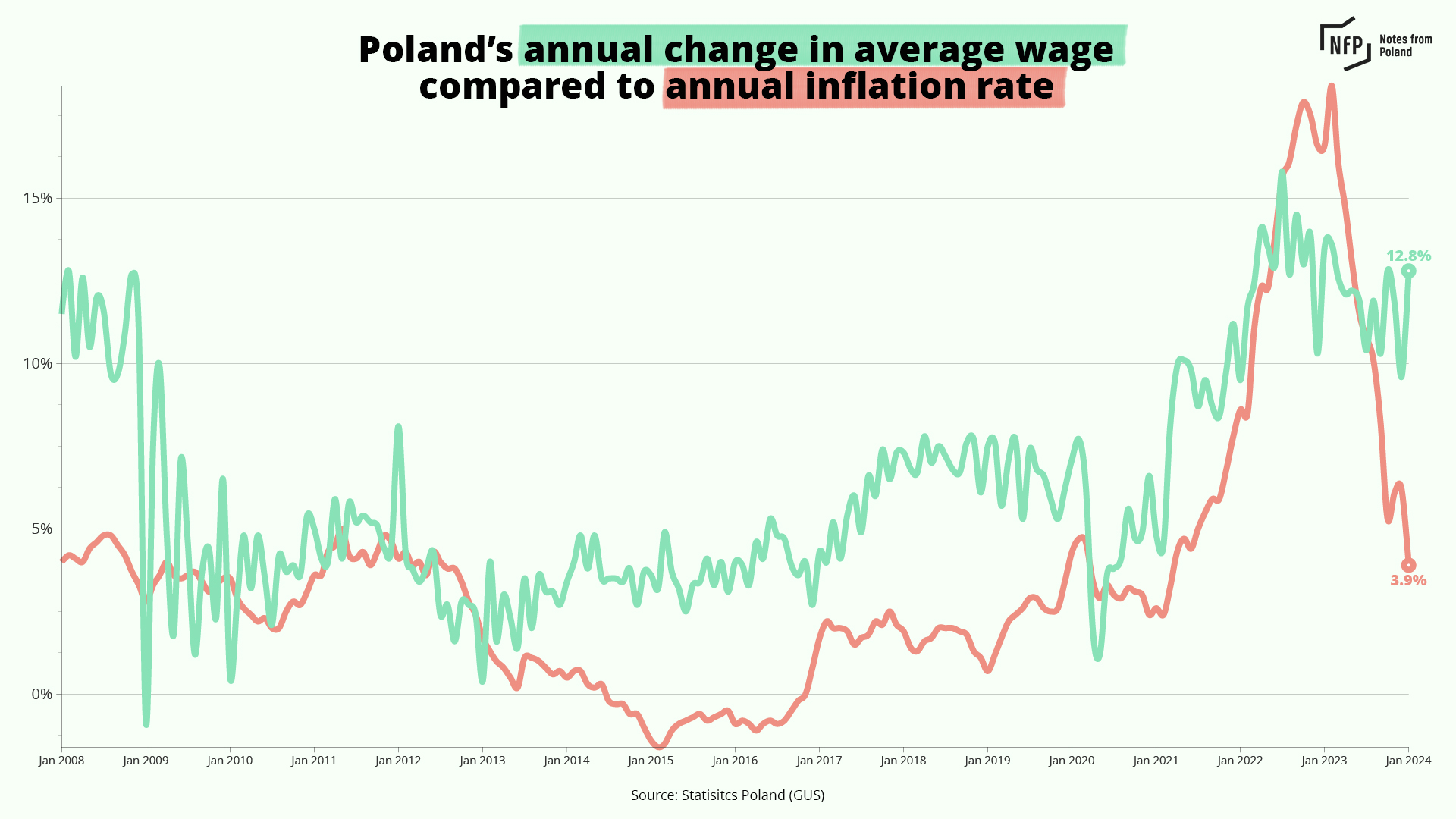Poland’s real wage growth fastest in 16 years

In January, the average wage rose in Poland by 12.8% year-on-year to 7,768 zloty (€1,797) before taxes, faster than expected, data from Statistics Poland (GUS), a state agency, show.
According to analysts, who had expected a rise of around 11%, wage growth was mainly supported by a record increase in the minimum wage that partly came into effect at the beginning of the year.
Meanwhile, thanks to a slowdown in inflation in January, real wages (i.e. earnings adjusted for inflation) rose by 8.9% last month, the most since April 2008.
GUS’s data on average waves only includes earnings of workers at companies with more than nine employees. Those who are self-employed and those working in the public sector are not included in the average.
“The main factor driving the increases was the increase in the minimum wage,” Jakub Rybacki, the head of the macroeconomics department at the Polish Economic Institute (PIE), told broadcaster RMF FM.
Throughout 2024, Poland will see a record rise in minimum wage. The increase, however, has been broken down into two stages. The first part of the increase, from 3,600 zloty (€832.71) to 4,242 zloty (€981.21) went into effect in January. In July, the minimum wage will be further increased to 4,300 zloty (€994.87), representing a total rise of 19.4% compared to December 2023.
Poland’s government has announced plans for a record rise in the minimum wage next year, with the figure set to increase by over 23% between now and July 2024 https://t.co/S2PJi7oxEM
— Notes from Poland 🇵🇱 (@notesfrompoland) June 14, 2023
Due to high inflation caused by the post-pandemic economic rebound and the outbreak of war in Ukraine, real wage growth in Poland was negative for 12 of the 14 months between June 2022 and July 2023.
Wages returned to growth in real terms in August 2023, after inflation started to subside. Since then, inflation has continued to slow down, falling below 4% in January for the first time in nearly three years.

According to analysts, wages will continue to rise in Poland in the coming months.
ING Bank Śląski economists determined a “willingness of companies, especially large ones, to make increases close to record highs according to NBP [National Bank of Poland] surveys,” noting, however, that some sectors of the Polish economy, e.g. furniture production, are still facing difficulties “which has an impact on employment”.
Private sector employment fell in January by 0.2% year-on-year to 6.5 million jobs. Month-on-month, however, employment rose, which, according to analysts at Bank PKO BP, “could herald a rebound in labour demand given the weak 2023”.
Przeciętne wynagrodzenie w sekt. przeds. w styczniu wzrosło o 12,8% r/r, silniej od oczekiwań (kons: 10,9% r/r; PKO: 11,3% r/r). Przyspieszenie dynamiki płac względem grudnia to w dużej mierze efekt wzrostu płacy minimalnej od początku roku o 21,5% r/r. W rezultacie wynagrodzenia… pic.twitter.com/JsAUHeDSHM
— PKO Research (@PKO_Research) February 20, 2024

Notes from Poland is run by a small editorial team and published by an independent, non-profit foundation that is funded through donations from our readers. We cannot do what we do without your support.
Main image credit: Tiger Lily / Pexels

Alicja Ptak is senior editor at Notes from Poland and a multimedia journalist. She previously worked for Reuters.






